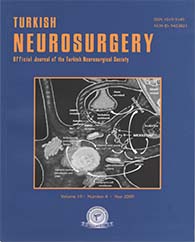Turkish Neurosurgery
2009 , Vol 19 , Num 4
1,3Ege University, Department of Neurosurgery, İzmir, Turkey
2Mehmet Aydın State Hospital, Department of Neurosurgery, Samsun, Turkey Although anterior surgical approaches to the cervical spine have become popular and safe in recent years, they also have some complications. We present a case of loss of an anterior cervical plate screw by the natural tracts. The patient was a 47- year-old woman who was operated on for cervical spondylotic myelopathy at another institution. Surgical interference included two levels of anterior discectomy, iliac graft placement and fixation using plate and screws. Two years later, plate dislocation and partial migration of the upper screws were observed. After 7 years the patient complained of dysphagia and she accepted removal of the osteosynthesis. Radiographical examination showed that one of the upper screws was missing and two lower screws were broken. Esophageal perforation was found during the surgery and repaired. Further progress was favourable. Complications associated with esophageal perforation may range from massive infection and death to spontaneous recovery. Erosion of the esophageal wall due to extruded bulky constructs may lead to a persistent fistula, abscess or septic diffusion. Spontaneous perforation of the esophagus and screw loss via the gastrointestinal tract make this case interesting.. Keywords : Esophageal perforation, Cervical spine, Complication, Screw loss
Corresponding author : H. Serdar Isık, serdarisik1@hotmail.com
2Mehmet Aydın State Hospital, Department of Neurosurgery, Samsun, Turkey Although anterior surgical approaches to the cervical spine have become popular and safe in recent years, they also have some complications. We present a case of loss of an anterior cervical plate screw by the natural tracts. The patient was a 47- year-old woman who was operated on for cervical spondylotic myelopathy at another institution. Surgical interference included two levels of anterior discectomy, iliac graft placement and fixation using plate and screws. Two years later, plate dislocation and partial migration of the upper screws were observed. After 7 years the patient complained of dysphagia and she accepted removal of the osteosynthesis. Radiographical examination showed that one of the upper screws was missing and two lower screws were broken. Esophageal perforation was found during the surgery and repaired. Further progress was favourable. Complications associated with esophageal perforation may range from massive infection and death to spontaneous recovery. Erosion of the esophageal wall due to extruded bulky constructs may lead to a persistent fistula, abscess or septic diffusion. Spontaneous perforation of the esophagus and screw loss via the gastrointestinal tract make this case interesting.. Keywords : Esophageal perforation, Cervical spine, Complication, Screw loss





